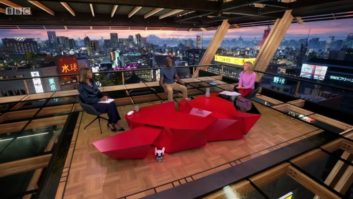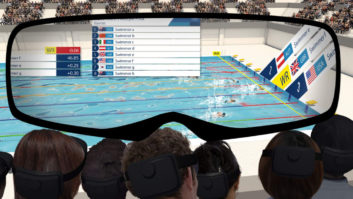We all know the challenges the media and entertainment industry has faced during 2020, but for Dalet there is still reason to celebrate.
This year the company is celebrating its 30th anniversary. Having started in the radio industry, Dalet took the leap into newsroom production and gradually into TV production and post. It’s seen the industry move from analogue to digital, and the more recent shift to file-based workflows.
Last year, it acquired Ooyala’s Flex Media platform, expanding Dalet’s solutions beyond its traditional customer base, and accelerating the company’s strategic move to increasing recurring revenue models, with a subscription/SaaS-based services offering.
So, how has Dalet weathered the storm that none of us saw coming? “Remarkably well I would say,” states Bea Alonso, director of product marketing at Dalet. “Initially everyone seemed to be in shock and we felt that the pulse of the industry sort of stopped for a few days while we were trying to work out how we were going to react as an industry. But, we were able to become 100 per cent remote within a few days, all of our employees were able to work safely from home, with no negative impact to customers. We’d actually done a couple of dry runs just before the pandemic really hit, and I thought that was a very interesting way to check that all of our systems were in place that we could continue to develop remotely. We also realised pretty quickly that we needed to look at new ways of communicating with our customers.”
“We quickly packaged the new SaaS offering Dalet Galaxy xCloud, which actually won one of TVEurope’s Best of Show awards, and we’re very, very proud of that,” she continues. “The solution extends the on premises installation of a Galaxy solution so that people can remotely work from wherever they happen to be. That was a pretty quick turnaround to help some of our customers that had 80 per cent of their workforce that were home based.”
For many countries there seems to be no end to the pandemic at the moment, is Dalet feeling robust as the situation continues? “We feel that the industry as a whole has sort of taken this in our stride,” Alonso continues. “We know this is the way that we’re going to have to work for the foreseeable future.
“With the next NAB postponed we really have to plan for this new reality. Connecting with customers, connecting with our partners is all going to have to be online and we have reshaped our delivery teams to work remotely, training for our customers all happens remotely, and even rethinking the way that we deliver our solutions in the sense of having user interfaces that don’t need a lot of training. The days of having a trainer on site for perhaps two weeks are gone, therefore the general user experience has to be a lot more self contained with less requirements of having people travelling around.”
A Flexible solution
As stated earlier, it’s about a year since Dalet acquired the Ooyala Flex Platform. Alonso says the team has learnt a lot from the implementation of Flex into the business. “I came from the Ooyala side of the business and so it’s been interesting to see how a lot of the team at Dalet were looking forward to having the complimentary offerings knowledge that the Ooyala team was bringing in, especially the OVP/OTT expertise. It was almost like a mix between the start-up experience that Ooyala was bringing alongside Dalet’s 30 years of experience in the broadcast industry in newsrooms.
“One of the important areas of the acquisition of Flex was the modern architecture. Flex is Cloud native, it’s sold on a subscription model, and Dalet needed to take that path in a much more aggressive way,” Alonso explains. “Bringing the Ooyala expertise to the modern architecture, the API based solutions, has really helped because we’re now transforming all our products to be offered as SaaS models and migrating towards a modern microservices based architecture. Sometime in the new year we will see Flex offered as a multi-tenant solution, which means that we can deliver it truly as a SaaS offering where people subscribe and expand and they’ll have that elasticity to launch new offerings. We are also bringing a lot of the production values that Galaxy has into Flex. So those are major changes that are happening to our product lineup throughout 2021, we’re busy working on that right now.”
Alonso says Dalet would have implemented these changes even if it hadn’t bought Flex, but the acquisition was an acceleration strategy. “In order to survive in our industry today you have to be able to offer a software solution or content supply chain in a SaaS model, and the option of a Cloud-based infrastructure,” she adds. “Not all customers are going to take it 100 per cent Cloud-based, it could be hybrid as well, but you have to be able to offer that. The market and the industry generally is moving towards that.”
Industry transformation
Getting back to the impact the pandemic has had on the industry, like everyone else Alonso has watched remote production jump to the forefront of everything we do. “It’s not just about live production, it’s about production of episodic content, commercials, news packages, everything needs to be done with remote workforces. 2020 is transformative moment in the way that everyone is working from home, and as a technology provider we have helped accelerate that.”
So, other than the on-going issues we’re facing from the pandemic, what does Alonso think will be the next challenge the industry will face? “I think for the industry it’s stability. Of course there’s currently a global issue, but how businesses in our industry can survive through this uncertainty is a challenge,” she states. “There’s very little predictability. So we need to constantly reassess where we are going, is our direction right, do we need to re-steer in view of what else is changing around us?
“At Dalet we took a hard look at our strategy in April and we’ve transformed it to be able to make it through the next three to five years, considering the challenges that we know now. We revisit it constantly and adjust sometimes because an offering that we thought a few months ago would probably be a good option or a good idea needs to be reassessed. We never stand still!”







